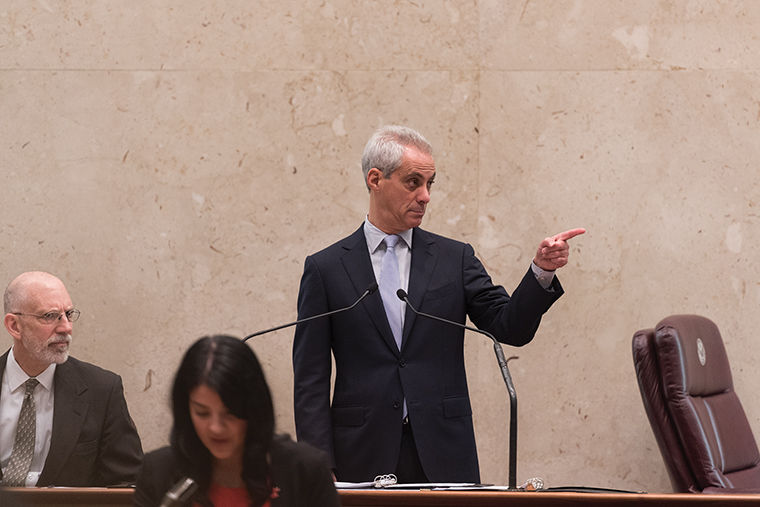Alderman, activist search for reform updates
Mayor Rahm Emanuel, pictured here at a City Council meeting Feb. 22, has yet to introduce a plan to implement the recent Department of Justice recommendations
February 27, 2017
After more than a month since the U.S. Department of Justice released its report on the Chicago Police Department and a new administration has taken office in Washington D.C., activists and aldermen are now calling for action on the issues and recommendations raised in the report.
“There is no issue more important than [police reform], and we need to have regular updates,” said Ald. Leslie Hairston (5th Ward), adding she has not yet received information from Mayor Rahm Emanuel’s administration for a plan to implement the DOJ recommendations.
The DOJ report, released Jan. 13, stated CPD lacks accountability for misconduct, has insufficient training in de-escalation tactics and engaged in a pattern of unreasonable force—including deadly force, as reported the same day by The Chronicle.
“The incidents described in this report are sobering to all of us,” Emanuel said at a press conference the day of the release. “Police misconduct will not be tolerated anywhere in this city and those who break the rules will be held accountable for their actions.”
Lori Lightfoot, chair of the Police Accountability Task Force and president of the Chicago Police Board, told The Chronicle many of the recommendations from the DOJ are similar to the recommendations from her organization’s report in April 2015.
Further trust issues could arise if action is not taken sooner rather than later, according to Lightfoot.
“The DOJ and [PATF] came up with a range of different recommendations, [and] some are going to take more time to implement,” Lightfoot said. “I would expect and hope the mayor and his team would put out a specific, comprehensive plan for implementations of the various recommendations with a timeline for when they’re going to be implemented.”
Frank Chapman, field organizer for the Chicago Alliance Against Racist and Political Repression, expressed doubt that Emanuel will move on the recommendations.
“The whole approach of [the Emanuel] administration has been to excuse and justify police crimes,” Chapman said. “Through drawing out the process, ducking and dodging techniques, this is another one of those.”
During the January press conference, Emanuel said the recommendations would be taken seriously.
The report also acknowledged CPD has been enacting reforms since the police dash-cam footage of the fatal shooting of 17-year-old Laquan McDonald was released November 2015, which prompted the two-year investigation. Reforms include a two-year plan to mandate body cameras for all CPD patrol officers, as reported Sept. 26, 2016 by The Chronicle. However, the report stated that stronger training, oversight and accountability are still needed.
According to Chapman, all recent police reforms, including the creation of the Civilian Office of Police Accountability to replace the Independent Police Review Authority—as reported Oct. 10, 2016 by The Chronicle—are diversions to steer the conversation away from community oversight of police.
“The [DOJ] recommendations are not about community control of police,” Chapman said. “They are modest reforms, but [Emanuel] is refusing to even move on that. And now that [President Donald] Trump is in the White House, I don’t think he even has to.”
Another concerning figure in the public’s eyes is the new U.S. Attorney General Jeff Sessions, who has spoken against consent decrees. Chapman said Sessions’ policy statements is against the “democratic process” and sends a signal to Emanuel that the consent decree will not be enforced and reforms do not need to occur.
Rev. Larry Dowling of the Community Renewal Society is in favor of civilian oversight of the police. A civilian oversight board to appoint chief administrators for COPA was deferred to an undetermined date and currently awaits City Council approval, as reported Oct. 10, 2016 by The Chronicle.
Dowling said Emanuel’s actions on issues such as the property tax rebate, as reported on Page 34, speak to his lack of commitment to solving the city’s violence problems.
The mayor’s current focus is getting favorable headlines before the 2019 mayoral election, and is only looking at the short term and not for long-term commitments to ensure community safety, according to Dowling.
“These reforms are also important to drive down the violence we’re seeing raging out of control in too many of our neighborhoods,” Lightfoot said.
Emanuel was in Washington D.C. for Chicago-related business meetings Feb. 13, according to the mayor’s public schedule. Afterward, reports were released that the DOJ would be in the city to begin working with the mayor to create a plan to implement the recommendations.
However, Hairston could not confirm this and said Emanuel is unwilling to work with her.
The Mayor’s Press Office and the CPD News Affairs Office did not respond to requests for comment as of press time.
Hairston said police reform is a national issue, and the Chicago community in particular is angry that police misconduct has been allowed to continue. If Emanuel were to not follow the consent decree, it could impact his re-election bid, she added.
“We need to have regular meetings and have aldermen give their input,” Hairston said. “I said [this] last year. [City Council] needs to have this done out in the open with meaningful discussions.”








